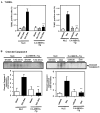Activation of extracellular signal-regulated kinase 5 reduces cardiac apoptosis and dysfunction via inhibition of a phosphodiesterase 3A/inducible cAMP early repressor feedback loop
- PMID: 17272811
- PMCID: PMC4115673
- DOI: 10.1161/01.RES.0000259045.49371.9c
Activation of extracellular signal-regulated kinase 5 reduces cardiac apoptosis and dysfunction via inhibition of a phosphodiesterase 3A/inducible cAMP early repressor feedback loop
Abstract
Substantial evidence suggests that the progressive loss of cardiomyocytes caused by apoptosis significantly contributes to the development of heart failure. beta-Adrenergic receptor activation and subsequent persistent phosphodiesterase 3A (PDE3A) downregulation and concomitant inducible cAMP early repressor (ICER) upregulation (PDE3A/ICER feedback loop) has been proposed to play a key role in the pathogenesis of cardiomyocyte apoptosis. In contrast, insulin-like growth factor-1 can activate cell survival pathways, providing protection against cell death and restoring muscle function. In this study, we found that insulin-like growth factor-1 activates extracellular signal-regulated kinase 5 (ERK5) and inhibits PDE3A/ICER feedback loop. Insulin-like growth factor-1 normalized isoproterenol-mediated PDE3A downregulation and ICER upregulation via ERK5/MEF2 activation, and also inhibited isoproterenol-induced myocyte apoptosis. To determine the physiological relevance of ERK5 activation in regulating PDE3A/ICER feedback loop, we investigated the PDE3A/ICER expression and cardiomyocyte apoptosis in transgenic mice with cardiac specific expression of a constitutively active form of mitogen-activated protein (MAP)/extracellular signal-regulated protein kinase (ERK) kinase 5alpha (MEK5alpha) (CA-MEK5alpha-Tg). In wild-type mice, pressure overload- or doxorubicin-induced significant reduction of PDE3A expression and subsequent ICER induction. Cardiac specific expression of CA-MEK5alpha rescued pressure overload- or doxorubicin-mediated PDE3A downregulation and ICER upregulation and inhibited myocyte apoptosis as well as subsequent cardiac dysfunction in vivo. These data suggest that preventing the feedback loop of PDE3A/ICER by ERK5 activation could inhibit progression of myocyte apoptosis as well as cardiac dysfunction. These data suggest a new therapeutic paradigm for end stage of heart failure by inhibiting the PDE3A/ICER feedback loop via activating ERK5.
Figures








References
-
- Kang PM, Izumo S. Apoptosis and heart failure: a critical review of the literature. Circ Res. 2000;86:1107–1113. - PubMed
-
- Olivetti G, Abbi R, Quaini F, Kajstura J, Cheng W, Nitahara JA, Quaini E, Di Loreto C, Beltrami CA, Krajewski S, Reed JC, Anversa P. Apoptosis in the failing human heart. N Engl J Med. 1997;336:1131–1141. - PubMed
-
- Lohse MJ, Engelhardt S, Eschenhagen T. What is the role of beta-adrenergic signaling in heart failure? Circ Res. 2003;93:896–906. - PubMed
-
- Wollert KC, Drexler H. Regulation of cardiac remodeling by nitric oxide: focus on cardiac myocyte hypertrophy and apoptosis. Heart Fail Rev. 2002;7:317–325. - PubMed
Publication types
MeSH terms
Substances
Grants and funding
LinkOut - more resources
Full Text Sources
Molecular Biology Databases
Miscellaneous

